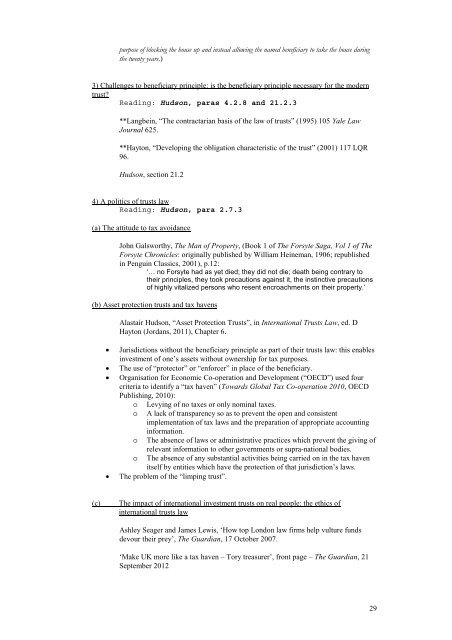Soton Equity and Trusts - alastairhudson.com
Soton Equity and Trusts - alastairhudson.com
Soton Equity and Trusts - alastairhudson.com
Create successful ePaper yourself
Turn your PDF publications into a flip-book with our unique Google optimized e-Paper software.
purpose of blocking the house up <strong>and</strong> instead allowing the named beneficiary to take the house during<br />
the twenty years.)<br />
3) Challenges to beneficiary principle: is the beneficiary principle necessary for the modern<br />
trust?<br />
Reading: Hudson, paras 4.2.8 <strong>and</strong> 21.2.3<br />
**Langbein, “The contractarian basis of the law of trusts” (1995) 105 Yale Law<br />
Journal 625.<br />
**Hayton, “Developing the obligation characteristic of the trust” (2001) 117 LQR<br />
96.<br />
Hudson, section 21.2<br />
4) A politics of trusts law<br />
Reading: Hudson, para 2.7.3<br />
(a) The attitude to tax avoidance<br />
John Galsworthy, The Man of Property, (Book 1 of The Forsyte Saga, Vol 1 of The<br />
Forsyte Chronicles: originally published by William Heineman, 1906; republished<br />
in Penguin Classics, 2001), p.12:<br />
‘… no Forsyte had as yet died; they did not die; death being contrary to<br />
their principles, they took precautions against it, the instinctive precautions<br />
of highly vitalized persons who resent encroachments on their property.’<br />
(b) Asset protection trusts <strong>and</strong> tax havens<br />
Alastair Hudson, “Asset Protection <strong>Trusts</strong>”, in International <strong>Trusts</strong> Law, ed. D<br />
Hayton (Jordans, 2011), Chapter 6.<br />
<br />
<br />
<br />
<br />
Jurisdictions without the beneficiary principle as part of their trusts law: this enables<br />
investment of one’s assets without ownership for tax purposes.<br />
The use of “protector” or “enforcer” in place of the beneficiary.<br />
Organisation for Economic Co-operation <strong>and</strong> Development (“OECD”) used four<br />
criteria to identify a “tax haven” (Towards Global Tax Co-operation 2010, OECD<br />
Publishing, 2010):<br />
o Levying of no taxes or only nominal taxes.<br />
o A lack of transparency so as to prevent the open <strong>and</strong> consistent<br />
implementation of tax laws <strong>and</strong> the preparation of appropriate accounting<br />
information.<br />
o The absence of laws or administrative practices which prevent the giving of<br />
relevant information to other governments or supra-national bodies.<br />
o The absence of any substantial activities being carried on in the tax haven<br />
itself by entities which have the protection of that jurisdiction’s laws.<br />
The problem of the “limping trust”.<br />
(c)<br />
The impact of international investment trusts on real people: the ethics of<br />
international trusts law<br />
Ashley Seager <strong>and</strong> James Lewis, ‘How top London law firms help vulture funds<br />
devour their prey’, The Guardian, 17 October 2007.<br />
‘Make UK more like a tax haven – Tory treasurer’, front page – The Guardian, 21<br />
September 2012<br />
29













